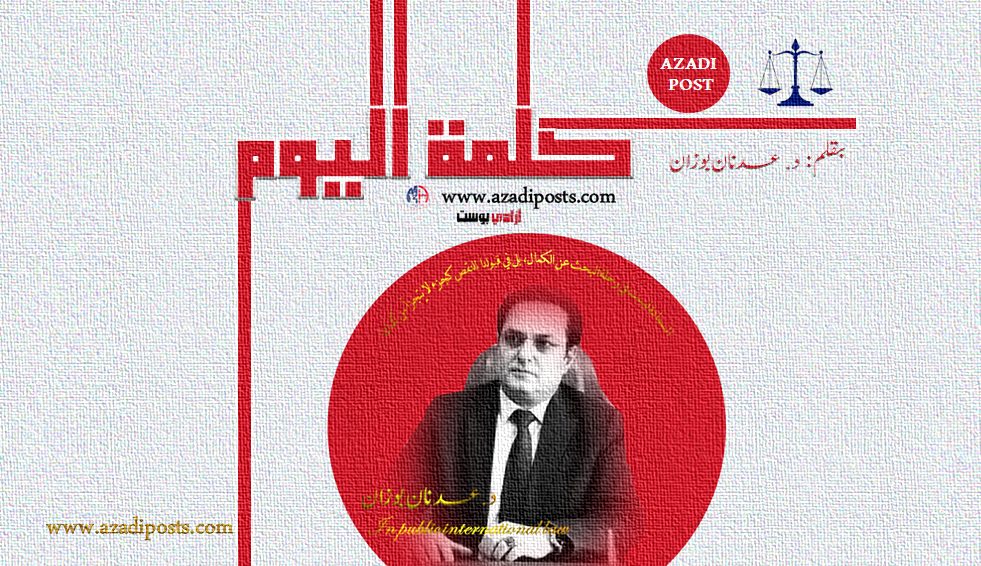I Am Not Defending the Conference... I Am Defending My Existence
- Super User
- Word of the Day
- Hits: 3346

By: Dr. Adnan Bozan
The issue is not about a seat that wasn't reserved for me, nor an invitation that wasn’t sent, not even a speech that wasn’t delivered in my name. The matter goes far deeper than all these superficial considerations that many get lost in as they follow the Kurdish political scene in Rojava—whether with cold neutrality or from behind the curtain of hollow applause. As for me, I am not defending "the recent Kurdish conference" held in Qamishlo on April 26. Rather, I am defending something far more profound, sacred, and perilous: I am defending my Kurdish existence in a political space that is being reshaped without my consultation, without my respect, and without my mind, position, and vision being taken into account.
Some friends' questions about my absence from the conference are legitimate, but they also reveal the depth of the flaw: when mere attendance is assumed to be proof of loyalty or a signal of affiliation—and when an intellectual becomes a "suspect" simply for refusing to attend a feast to which he wasn’t invited, nor granted a seat worthy of his stature and role.
Let us face the truth without makeup: This conference, despite everything said about it, is not the inclusive Kurdish conference we’ve long dreamed of—not in terms of representation, not in objective, not in political vision, and not in organizational structure. It is, quite plainly, an agreement of interests between party forces whose loyalties lie beyond the borders of Rojava and Syria. When the Syrian Kurdish decision-making becomes a mere annex to negotiations between Qandil and Erbil, we are no longer facing a national project, but rather a political deal made upon the ruins of a sweeping popular dream that always longed for leadership that represents it—not one that confiscates it.
What hurts more than ideological disputes is the sidelining of reason in favor of blind loyalty, and the marginalization of thinkers in favor of cheerleaders—as if what is required of us is to be slaves on a political stage that recognizes only clapping and raised hands. Can it be conceivable that academics, jurists, and intellectuals from the frontlines are excluded? Isn’t this occasion—if its intentions were sincere—an opportunity to search for an independent elite capable of carrying the Kurdish project toward sovereignty and free thought? Or is that considered a threat to the equations of domination and alignment?
I do not see in this conference a true representation of the Syrian Kurds. Rather, I see it—as I understand it—as an extension of overlapping interests among the PKK (Turkey), the KDP (Iraq), and the PUK (Iraq), and as a front for regional understandings that leave Syrian Kurds with only a marginal role—not a central one.
Yet still, I do not reject its outcomes entirely. I support them from a standpoint of political necessity, not ideological conviction. Because if the outcomes serve the interests of the Syrian Kurds, then they remain the only viable bet in a ruthless, complex world. But between the desire to support the outcomes and the warning about the nature of the alliance itself lies an anxious distance that must be spoken: I fear this agreement is merely a temporary political marriage of convenience—one whose ties will dissolve once the need is over, and the swords will once again be drawn—pointed at our chests, we the sons of the interior, the ones with a dual identity: we have no party, but we have a cause.
My absence from the conference is not a rejection of the Kurds, but a rejection of slavery in the name of Kurdaiety. And I was not the only one absent—a genuine vision that represents us was absent too: we, who belong only to this people and are tied only to its fate—not to intelligence agencies that transcend borders.
In the end, let me say this clearly: I am not defending the conference—I am defending my right to be a Kurd outside the alignments, inside the struggle, a partner in the dream, not a follower in the line.


